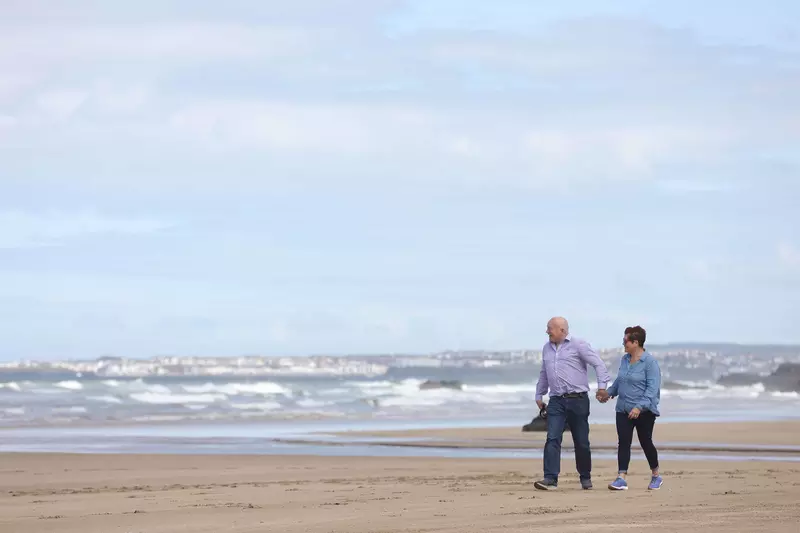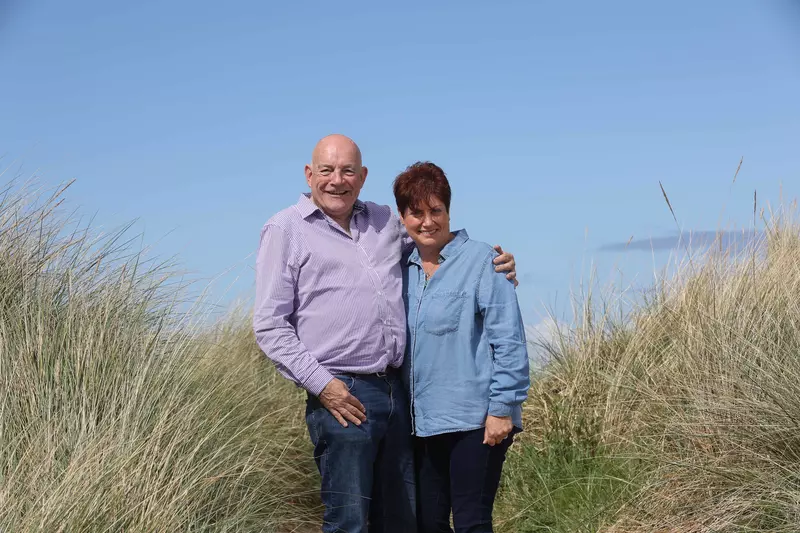"Parkinson's just came as part of the package” - Elaine's story
Elaine’s partner David has Parkinson’s. As a couple, they have faced the challenges of Parkinson’s together, including David having deep brain stimulation (DBS) last year.
When Elaine was introduced to David 9 years ago, she felt a spark straight away. “We had so much in common – we both have a passion for rugby, love the area we live in, and love outdoor activities,” says Elaine. “Even within those initial couple of hours, I thought we’d really clicked.”
At that point, Elaine was unaware David had Parkinson’s, but it did make its impact. “We were chatting and then out of the blue, David disappeared,” Elaine remembers. “For days after that I tortured myself – was it something I’d said?”
About a month later, David messaged Elaine and told her he had Parkinson’s. “He confided he left the night we met because he needed to take his medication. He was embarrassed that his tremor would get too obvious and put me off,” Elaine explains.
“He said he would love to see me again, but it was entirely my decision. I didn’t really know anything about Parkinson’s at that time. To me it just came as part of the package.”
Especially during the first year of our relationship, David would push me away...It took a long time for our relationship to bed in.
Bedding in
After David was diagnosed with Parkinson’s at 42, his marriage broke down and he had taken early retirement on medical grounds from the prison service. When Elaine met him, his confidence was very low.
“Especially during the first year of our relationship, David would push me away,” Elaine remembers. “He would say, ‘You don’t need someone like me’ and didn’t believe that I wanted to be with him. It took a long time for our relationship to bed in.”
David’s mental health is still a challenge. “I am open and honest with people that David’s mood dips, that he can’t attend things with me, or that we have to cancel at the last minute because he is feeling so drained with Parkinson’s.
“Sometimes a wave of depression can sweep in at any stage for no apparent reason. One hour he can seem fine and an hour later, you think where has he gone? He’s felt so tired and stressed by something, he’s just gone to bed.
“I have learned when David is in a ‘low’ mood, I just step back, let him be, be supportive, but take the respite for myself.”

A waiting game
When David’s drug treatments were no longer effectively managing his Parkinson’s symptoms, his specialist suggested deep brain stimulation (DBS) surgery.
“My initial thoughts were, ‘Yes, brilliant!’,” says Elaine. “And when they finally gave us the go-ahead I wanted to jump over the moon! But then the pandemic hit and the surgery that was within our grasp was taken away from us.”
After an 18-month wait, David was finally given a date for surgery. With no surgical centre in Northern Ireland, David and Elaine went to London for the operation. And due to COVID restrictions at the time, Elaine could only drop David at the front door of the hospital.
“We had a real sense of euphoria on the day – we couldn’t believe it was finally happening. I’m a practical person so I tried to keep a hold of my emotions when I dropped him off, but then I had to fly back home leaving David in London. Once home, I sat in the park crying to a friend wondering if things would be OK.”
Two and a half weeks later, Elaine returned to London to bring David home. “When I arrived at the hospital, David and a nurse were waiting for me at the entrance. It was busy, but I ended up walking straight past him – I didn’t recognise him! He looked so young, so well. The stress had been lifted,” Elaine recalls.
Facing the challenges
Elaine admits there are still challenges to face. “Straight after surgery, David’s attitude was very much, ‘I can conquer the world now’. And that was a real concern, because he was still recovering.
“And now, the surgery has helped David’s motor symptoms, but he still has Parkinson’s and his energy can still be very low.
“We’ve also had years of broken sleep because David was so restless at night. I was under the impression this would improve after the operation, but that now seems unlikely.
“It’s been very difficult when I have to get up for work. But now I will just go to another room. I don’t love him any less and if anything it’s improved our relationship – I used to lay there, trying to settle him, then doze until the morning. We’d both get up feeling very tired.
“Now we often sleep in separate rooms and both feel a lot more refreshed in the morning. You just have to find a way through it.”
It’s difficult to take that time for yourself, but looking after yourself is so important.
'Caring is constant'
There are days where Elaine does struggle. “Caring is constant, even the little things – I never sit down at a table in a cafe first for example, it’s me that gets the coffee. I am always considering David.
“Working from home during the pandemic was hard. I was constantly wondering what was happening with David. For example, I’d think, ‘Why isn’t he up yet?’ You can never leave caring behind. Hybrid working has been great though – I love it as I get a social life at work. It’s difficult to take that time for yourself, but looking after yourself is so important.”
As well as regular reflexology sessions, which Elaine describes as ‘life-giving’, the beach close to where Elaine and David live offers solace for the couple. “We have a one year-old Springer spaniel, Duke, who is very healing. Getting out with him for a walk on the beach is great for both of us.”
Elaine is also a member of her local sea swimming club. She explains: “The group has been my saviour. Everyone is very kind and will ask, ‘How are you?’ I don’t hide what has been happening from my friends. I’m a talker and if I can talk to people, I learn more and can help David more. Sharing is vital and people are always understanding and supportive.”

A blessing
For Elaine, meeting David and living with Parkinson’s, has been a journey. “My awareness and understanding of the condition has gotten better over time as well as my empathy – people on the outside don’t know what it’s like.
“There are tough times. Even now, David can be defensive about Parkinson’s. And sometimes I do think, ‘Who’s supporting me?’ I’m a very outgoing person, but how do others do it?
“I always say though, ‘Let’s think this through together’,” says Elaine. “Parkinson’s is like an added extra you have to work at, but it’s made us much stronger as a couple. I feel blessed to have David.”
- Read more about relationships and Parkinson's or caring for someone with the condition.

